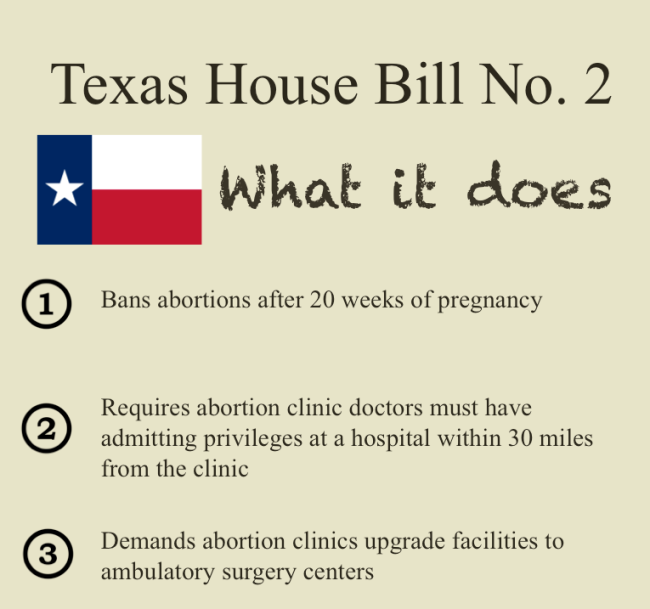Texas is embroiled in a battle over abortion rights.
The Supreme Court in November refused to intercede in a legal dispute over the recent Texas law that restricts access to abortion clinics, but it could be months before either side can claim a victory.
Texas House Bill No. 2 was signed into law July 18. The law bans 20-week abortions and requires that abortion clinics have admitting privileges at a hospital within 30 miles in order to stay open.
Planned Parenthood decided to fight the admitting privileges aspect of the bill because it affected the most women immediately, said Kelly Hart, senior director of government relations at Planned Parenthood of Greater Texas.
“We determined which of the pieces is integral in delaying if we could because they would harm the greatest number of women in the shortest period of time, and that’s primarily the admitting privileges,” Hart said.
The admitting privileges aspect means that an abortion clinic must be within 30 miles of a hospital that will take the clinic’s patients in an emergency.
SMU political science professor and constitutional law expert Joe Kobylka explains why Planned Parenthood and others question the constitutionality of the law.
“The question will be does this unduly burden the abortion right embedded in the privacy right of the Constitution,” he said.
Kobylka said this poses a constitutional issue because access to abortion is more restricted for some than for others.
“The problem is if you are in East Texas or West Texas and hospitals are few and far between is what you have to do is haul yourself to Houston or Dallas or one of the major cities where the clinics may have on staff admitting privileges,” he said.
The laws affect members of certain socioeconomic classes and geographic areas differently.
“We are going to do everything we can to make sure all women in Texas, regardless of their zip code, their income level, or whether or not they’re insured, have access to the services that they need,” Hart said.
One in three women will have significantly decreased access or no access to abortion clinics due to the law, according to Planned Parenthood.
The Supreme Court decided in November not to hear the case against the admitting aspect of the law. This is not the final ruling in the case. The Fifth Circuit Court of Appeals will hold a hearing in January to decide the matter.
“We’re disappointed,” Hart said. “We just know it’s not the last word in the story.”
While Hart and others are upset with the Texas law, others support the restrictions.
Collette Marchesseault, an SMU sophomore, co-founded Mustangs for Life last spring and supports laws that limit abortions.
“I think any step you can take toward causing fewer and fewer abortions is moving toward a pro-life cause,” she said.
For Marchesseault, the issue revolves not only on abortion, but also on women’s health.
“We are pro-woman, pro-mother and pro-child. A lot of these rules are increasing the care that a mother receives,” she said.
In a survey of 130 SMU students administered on SurveyMonkey in November, 63 percent said they thought it was not within the state’s rights to make restrictions on abortion.
“Access to reproductive healthcare should have nothing to do with where a person lives,” first-year Katie Anne Head wrote in the comment section of the survey. “The abortion issue has strayed away from the idea of ‘saving babies’ and has become about controlling women.”
However, 57 percent agreed with the mandate of the law requiring a clinic to have admitting privileges at a nearby hospital.
Many Texans simply don’t fully understand what the law means.
“People don’t know a lot about the law and the full ramifications of that law,” Kobylka said. “Part of that is because it hasn’t been applied.”
The anti-abortion legislation became national news beginning with Texas State Sen. Wendy Davis’ 11-hour filibuster on the Texas House floor this summer. Davis is now running for Texas governor.
While 72 percent of students surveyed had heard about the anti-abortion legislation, only 53 percent knew the bill had gone to the Supreme Court on appeal.
Kobylka expects more debate will be created as the law begins to be applied more fully over the coming months.
“When a law’s been applied, stories and narratives arise that help to inform debates to a degree,” he said.
Hart and the rest of the Planned Parenthood team are preparing for the long fight ahead.
“Planned Parenthood is still open, we are still here for women and we haven’t given up,” Hart said. “We will continue with this fight. If we don’t prevail in court, we still aren’t giving up.”









